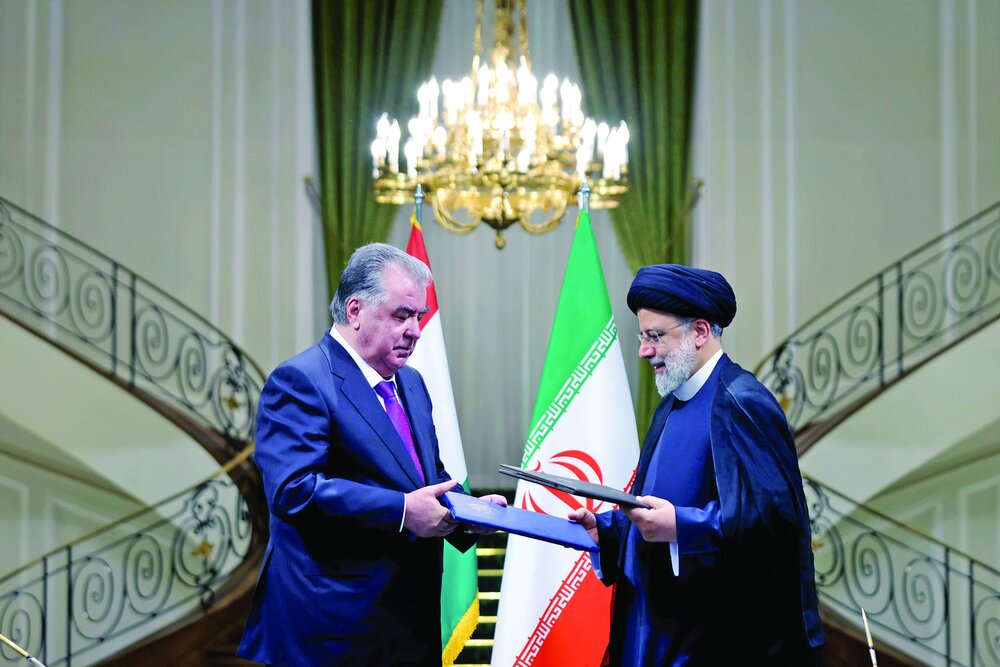
TEHRAN — After officially welcoming Tajikistan’s President Emomali Rahmon Monday morning, President Seyyed Ebrahim Raisi of Iran and his Tajik counterpart were witness to signing a variety of memorandums of understandings (MOUs).
Rahmon, who arrived on Sunday afternoon, was officially welcomed by Raisi at Saad Abad Palace.
The two presidents then held a fairly lengthy meeting behind closed doors. After the meeting, the two leaders and the respective ministers of Iran and Tajikistan held a special working group to observe various areas of cooperation.
The special working group ended on a positive note, as senior officials of Iran and Tajikistan signed 17 documents of cooperation in the fields of politics, economy, trade, transportation, investment, new technologies, environment, sports, energy, judiciary, education and research, and tourism in the presence of Raisi and Rahmon.
These documents were signed by the ministers of the related fields from the two countries.
Later, the two presidents held a joint press conference to address the outcome of their negotiations.
“Today's meetings paved the way for good decisions for relations between the two countries,” Raisi said.
"We have good relations with Tajikistan for various reasons, including neighborliness, common culture, religion, language and civilization," he stated.
Pointing out that good steps have been taken in other areas, especially the implementation of the memorandums signed in Dushanbe, Raisi said, "The two countries have a serious determination and will to develop political, economic, trade, cultural and interaction in the fields of energy, tourism, water and natural resources and science and technology.”
According to Raisi, improving the level of bilateral relations can lead to the strengthening of regional and international interactions.
“The development of relations between the two Muslim and neighboring countries can be promising for the two nations and interests of the two countries,” the Iranian president stated.
Noting that the two countries share common views on regional issues, Raisi said, “The two countries believe that the presence of outsiders in the region has not, and will not, provide security in any way, and that regional issues should be discussed and settled through talks between officials and heads of state of the region itself. The two countries believe that the presence of outsiders cannot solve any problem.”
Iran and Tajikistan share common concerns about Afghanistan
The president added that Iran and Tajikistan agree on the issue of Afghanistan and that an inclusive government should be formed in this country that represents all parties, groups and ethnic groups.
“Both countries also want stability and security in Afghanistan and throughout the region, and consider the presence of terrorists in this country very worrying,” he noted.
Emphasizing that Iran and Tajikistan do not tolerate the presence of terrorists in Afghanistan or other parts of the region, Raisi said that the two countries believe that the outsiders and the evil hands of the global arrogance that strengthen Daesh and other terrorist groups in the region do not even think about the security of the people of Afghanistan and the region, and they are only pursuing their own political goals and interests.
“Evidence of this was the 20-year presence of NATO and the United States in Afghanistan, which resulted in nothing but war, bloodshed and destruction for the country,” Raisi remarked.
He then noted that Iran and Tajikistan also share views in the fight against terrorism, narcotics and organized crime, adding that cooperation between the two countries and countries in the region in this area can help stabilize and strengthen regional security.
For his part, Tajik President Rahmon expressed satisfaction with his visit to the ancient land of Iran.
Pointing to the 30th anniversary of diplomatic relations between the two countries that followed the breakup of the Soviet Union, Rahmon said, “In this 30-year period, Tajikistan and Iran have taken practical steps to consolidate and develop inclusive relations and have been able to achieve a high level of constructive cooperation.”
The Tajik president described the meeting and the talks in Tehran as a continuation of the ongoing bilateral efforts to expand relations in line with the interests of the two countries.
He said, “Today, in an atmosphere of mutual understanding, trust and respect, we had fruitful discussions and discussed the most important topics for relations between Tajikistan and Iran.”
Referring to the long-term cooperation document between the two countries which is set to end on 2030, Rahmon noted, “During today's visit, good agreements were signed in various economic and trade fields, as well as the activities of the Iran-Tajikistan Joint Council and the Joint Investment Committee.”
“I am confident that these agreements will give new momentum to the two countries' cooperation in the fields of politics, economy, trade, investment and culture,” he underlined.
The Tajik president said that constructive political talks between the two governments will pave the way to further strengthen the atmosphere of mutual understanding and mutual trust and securing the interests of the two countries.
Describing the current situation in the region and the world as sensitive, Rahmon stressed the need for cooperation between the two countries in areas of security.
“The two countries have common concerns about Afghanistan and stated that they welcome all political and diplomatic efforts and humanitarian aid for ensuring the security and prevent humanitarian disaster in this neighboring country.”
He also mentioned the strengthening of cooperation in the fight against terrorism, drug trafficking and organized crime as other agreements reached during the visit.
Concluding his remarks, Rahmon said, “Bilateral cooperation as well as cooperation between the two countries within the framework of regional and international organizations can help address common concerns of the two countries in these areas.”
**********H
Raisi says “Iran and Tajikistan do not tolerate the presence of terrorists in Afghanistan or other parts of the region.
TAGS

No comments:
Post a Comment